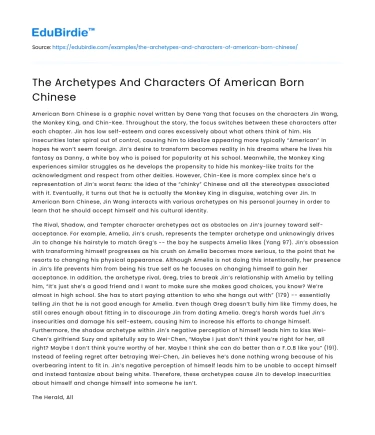American Born Chinese is a graphic novel written by Gene Yang that focuses on the characters Jin Wang, the Monkey King, and Chin-Kee. Throughout the story, the focus switches between these characters after each chapter. Jin has low self-esteem and cares excessively about what others think of him. His insecurities later spiral out of control, causing him to idealize appearing more typically “American” in hopes he won’t seem foreign. Jin’s desire to transform becomes reality in his dreams where he lives his fantasy as Danny, a white boy who is poised for popularity at his school. Meanwhile, the Monkey King experiences similar struggles as he develops the propensity to hide his monkey-like traits for the acknowledgment and respect from other deities. However, Chin-Kee is more complex since he’s a representation of Jin’s worst fears: the idea of the “chinky” Chinese and all the stereotypes associated with it. Eventually, it turns out that he is actually the Monkey King in disguise, watching over Jin. In American Born Chinese, Jin Wang interacts with various archetypes on his personal journey in order to learn that he should accept himself and his cultural identity.
The Rival, Shadow, and Tempter character archetypes act as obstacles on Jin’s journey toward self-acceptance. For example, Amelia, Jin’s crush, represents the tempter archetype and unknowingly drives Jin to change his hairstyle to match Greg’s -- the boy he suspects Amelia likes (Yang 97). Jin’s obsession with transforming himself progresses as his crush on Amelia becomes more serious, to the point that he resorts to changing his physical appearance. Although Amelia is not doing this intentionally, her presence in Jin’s life prevents him from being his true self as he focuses on changing himself to gain her acceptance. In addition, the archetype rival, Greg, tries to break Jin’s relationship with Amelia by telling him, “It’s just she’s a good friend and I want to make sure she makes good choices, you know? We’re almost in high school. She has to start paying attention to who she hangs out with” (179) -- essentially telling Jin that he is not good enough for Amelia. Even though Greg doesn’t bully him like Timmy does, he still cares enough about fitting in to discourage Jin from dating Amelia. Greg’s harsh words fuel Jin’s insecurities and damage his self-esteem, causing him to increase his efforts to change himself. Furthermore, the shadow archetype within Jin’s negative perception of himself leads him to kiss Wei-Chen’s girlfriend Suzy and spitefully say to Wei-Chen, “Maybe I just don’t think you’re right for her, all right? Maybe I don’t think you’re worthy of her. Maybe I think she can do better than a F.O.B like you” (191). Instead of feeling regret after betraying Wei-Chen, Jin believes he’s done nothing wrong because of his overbearing intent to fit in. Jin’s negative perception of himself leads him to be unable to accept himself and instead fantasize about being white. Therefore, these archetypes cause Jin to develop insecurities about himself and change himself into someone he isn’t.
Save your time!
We can take care of your essay
- Proper editing and formatting
- Free revision, title page, and bibliography
- Flexible prices and money-back guarantee
The Herald, Ally, and Shapeshifter archetype characters are allies on Jin’s journey toward self-acceptance. For example, Wei-Chen represents the ally archetype and urges Jin to ask Amelia out by saying, “Again is a chance for your lifetime!” (Yang 105), supporting him as he pursues his dreams. This situation shows one of the many ways that Wei-Chen acts as a supportive true friend for Jin. His encouragement and support allow Jin to gradually gain the confidence to be himself. Meanwhile, the archetype shapeshifter Chin-Kee forces Jin to confront his worst insecurities about his culture -- such as various Asian-American stereotypes -- until Jin, who appears as Danny, punches Chin-Kee’s head off; and he is then revealed to be the Monkey King (213). Although it may seem as if Chin-Kee is holding Jin back by bringing up more insecurities, he actually causes Jin to realize how much he’s deviated from his true self. Chin-Kee’s presence in Jin’s dreams pushes Jin to embrace himself and his cultural identity by making him face his insecurities. Additionally, the Monkey King acts as the herald for Jin and provides insight by telling him, “You know, Jin, I would have saved myself from five hundred years’ imprisonment beneath a mountain of rock had I only realized how good it is to be a monkey” (223). Because of his similar journey, the Monkey King makes the perfect herald for Jin. In fact, he guides Jin through his transformation from self-absorbed and angry to humble and reflective. Thus, these archetypes let Jin grow as a person and realize how much better his life is being himself.
Embracing identity is essential for strengthening one’s character. A person who accepts themselves and their flaws has a better chance of emerging as a stronger individual. When a person loses their self-identity, they often encounter many debacles in decision making and maintaining relationships. Everyone is unique and that distinguishes one individual in a group from anyone else. To hide uniqueness for the sake of fitting in is denying one’s ability to grow as an individual. The sooner a person embraces themselves, the sooner they can rid themselves of insecurities and live more comfortable lives.






 Stuck on your essay?
Stuck on your essay?

